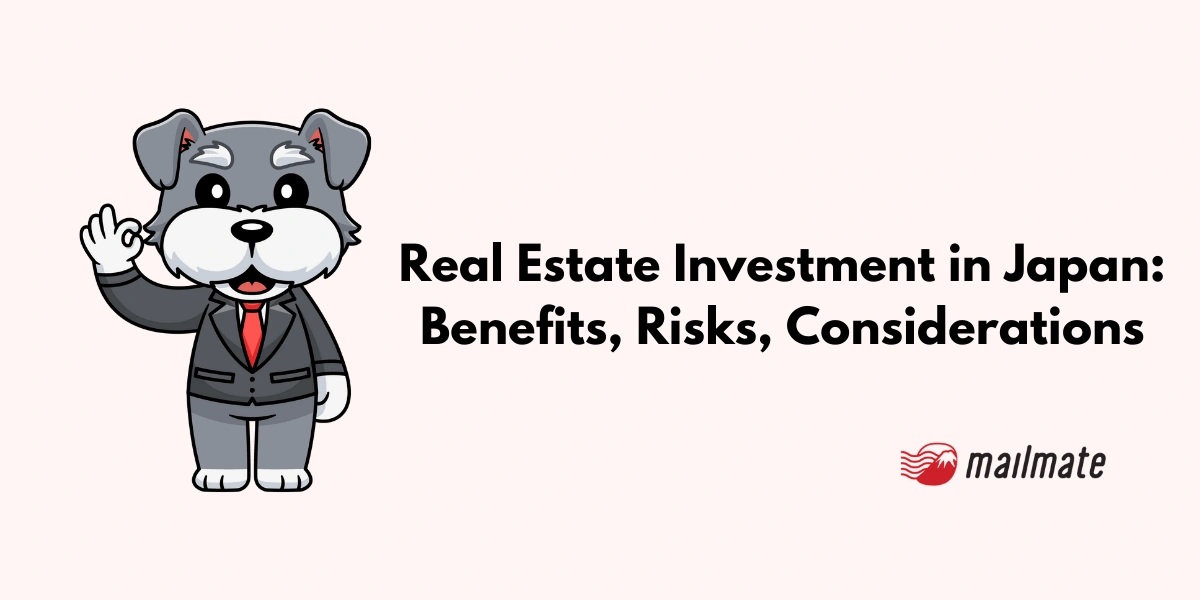Real Estate Investment in Japan: Benefits, Risks, Considerations

According to a real estate report published by CBRE Research, of all investments in major Japanese real estate (real estate deals over 1 billion yen), overseas investors accounted for roughly a quarter of the total in 2024.
This article provides a quick look at why Japanese real estate has become increasingly popular with overseas investors.
Overview of Japan's real estate investment market
At first glance, news of abandoned houses being given away for free and Japan’s aging population may not seem to set the stage for great foreign investment opportunities.
However, foreign investors are doing just that.
Investing in Japan is an attractive option for many reasons, including the ease with which foreigners can invest in property, the weak yen, low property prices, comparatively high rental yields, and stable infrastructure.
Combine this with rising real estate prices in many first-world countries, and the Japanese property market looks increasingly attractive.
We’ll take a look at each of these reasons in turn.
What are the benefits of investing in the Japanese real estate market?
a. Few restrictions on foreign property buyers
There are no visa or residency requirements for foreigners who wish to purchase land in Japan.
While some industry experts have stated that this may change if the government decides that foreign ownership of Japanese property has increased too rapidly—for example, increased stamp duty if the buyer is a non-resident (such as with foreigners purchasing property in Singapore)—at present, no such restrictions or regulations exist in Japan.
See also: How to Buy a House in Japan as a Foreigner Living Abroad
b. Cheap yen and low property prices
Due to the Bank of Japan's low interest rate policy, the yen continues to be weak against the dollar, providing foreign investors with a significant discount when entering the Japanese real estate market.
The opportunity is twofold: Japan's yen is weak, and property market price ranges are also low—particularly compared to real estate prices in other first-world countries and metropolitan cities. This brings us to the next benefit.
c. Low property prices + high rental yields
According to a report published by the Japan Real Estate Institute in 2022, Tokyo's property prices were cheaper than those of major cities worldwide.
Based on Japan Real Estate Institute data, the graph below sets Moto-Azabu as a baseline of 100 to show how Tokyo compares with other global metropolis locations.

Looking at the chart, we can see Hong Kong has a price index that is twice as high as Tokyo.
In the same report, Tokyo trailed Hong Kong and London in rental prices, providing investors with a potential yield of 4 to 6 percent on their real estate investments.
d. Stable infrastructure
A recent US News report placed Japan's infrastructure in second place behind Germany.

Japan's infrastructure is frequently ranked among the best in the world and is recognized as a model for promoting resilience against natural disasters, inclusiveness, and sustainability.
While some aspects of life in Japan can frustrate me as a Japanese, I love how well-maintained and well-functioning most public roads, transit systems, and facilities are.
What are the risks and challenges of investing in real estate in Japan?
a. Earthquake and natural disaster risks
When I moved to a new apartment a few years ago, the city presented me with a disaster map of the area. The map marked out areas in the neighborhood that had historically been subject to floods, mudslides, or earthquakes.
The exact location I had moved to was mostly clear, but a couple of blocks down the road, the area was shaded and outlined and otherwise earmarked as a "flood zone."
Now, whenever I consider moving, I look at a map like that outlines the historic natural events that have occurred there. (Japan Meterological Agency has a hazard map for all of Japan, and many cities and prefectures have their own version that can be found online.)
Natural disasters occur relatively frequently in Japan. Investors should do due diligence on their specific area before making any property investments.
Read about Japan's earthquake-resistant buildings here.
b. Potential regulatory changes
As previously mentioned, if foreigners continue to purchase at the same rate as they have in recent years, real estate prices will rise, which could make it challenging for Japanese residents and citizens to purchase housing.
The government has yet to enact such regulations, and it may never do so.
However, staying current on regulations will become part of your investment management strategy as a foreign investor.
c. Population decline
The issue of Japan's aging population creates uncertainty over how long rental yields will continue to be an attractive proposition.
On the other hand, Japan's tourism boom may provide ample opportunity for investors to acquire vacation rentals or other commercial properties.
d. Language barrier and legal, tax regulations
In a 2024 Swiss survey that ranked 116 countries' English ability, Japan sits at 92nd.

Japan's low English proficiency, combined with its love of paperwork and regulations, can create challenges for foreign investors looking for investment property.
For the most part—all paperwork must be completed in Japanese, so finding bilingual assistants or working with a bilingual service provider will become essential primarily on a language level.
Additionally, property owners must comply with tax obligations, including annual fixed asset tax and city planning tax. These property tax bills will arrive in Japanese and be sent to your Japanese property's mailbox.
An easy workaround is to use a bilingual tax representative service, such as MailMate, to receive and pay your property bills on your behalf.
Note: For property owners not living in Japan, MailMate provides a tax representative service allowing you to take care of the acquisition tax without needing to be physically present at your property in Japan.
What are the legal considerations for foreign investors?
While foreigners are allowed to purchase real estate in Japan without a visa or residence requirements, they must also consider the following:
a. Restrictions on the type of property foreigners can buy
While foreign investors can purchase most properties, some restrictions exist.
Foreigners cannot purchase property close to Japan's Self Defence Force bases.
Foreigners cannot purchase property with a "forest" or "agricultural" designation.
b. Required documentation for property purchases
If a non-resident investor (an individual without a visa) wishes to purchase property in Japan, he/she must create an affidavit issued by their consulate to certify their signature and place of address.
c. Tax implications for non-resident foreign investors
Foreign real estate investors are subject to the same property taxes as Japanese property owners. These include the following tax types:
Property acquisition tax
City planning tax
Stamp duties
Income tax (if the property is generating income)
d. Domestic contact person
Non-resident foreigners must establish a domestic contact person who will liaise between the non-resident property owner and the local government.
This domestic contact person often serves as the tax representative for the property.
Questions to ask yourself before investing in real estate in Japan
Here are some questions you can ask yourself to gauge your readiness for entering the Japanese property market.
Do I have sufficient capital for investment?
What is my total budget, including purchase, taxes, and renovation costs?
Can I sustain the investment during periods without rental income?
Am I seeking capital gains or rental income?
Is this a long-term investment or a short-term strategy?
Do I understand the specific market segment I'm entering?
Which regions align with my investment goals?
How do demographic trends impact property values?
What infrastructure developments might influence future property values?
Do I understand the tax implications?
Have I consulted with a Japanese real estate lawyer?
What are current market valuation trends?
How do different property types perform?
What are the occupancy and rental yield rates?
What are potential economic and environmental risks?
How will I manage currency exchange fluctuations?
Will I self-manage or use a property management company?
Do I understand maintenance and operational costs?
Am I prepared for ongoing property responsibilities?
What is my potential exit strategy?
Under what conditions would I sell?
How liquid is the market for my specific property type?
👉 Looking for an English speaking realtor? Check out this article!
Frequently asked questions
Is Japan a good real estate investment?
Investing in Japan is an attractive option for many reasons, including the ease with which foreigners can invest in property, the weak yen, the low purchase price, the comparatively high rental yields, and the stable infrastructure.
Can a foreigner invest in real estate in Japan?
Foreigners can freely invest in real estate in Japan as there are currently no visa or residency requirements for foreigners who wish to purchase land in Japan.
What are the popular types of real estate investments in Japan?
Popular real estate investments in Japan include purchasing residential properties (including akiya, apartments, etc.), commercial real estate, short-term and long-term rentals, office spaces, retail properties, and REITs (real estate investment trusts).
In closing
While this article mainly examined large-value real estate investments in Japan, another category of investors is attracted to the Country as a location for a second home.
For such investors, consider using MailMate and its property management services.
MailMate can help you pay taxes on your property and serve as your domestic point of contact and energy liaison, helping you connect your property to water, gas, electricity, and more.
MailMate's fluently bilingual tax representative service helps property owners stay up to date on their real estate tax bills by liaising between clients and the local government.

The service includes the following features:
Tax representative for annual real estate tax payments
Domestic point of contact for authorities (required by law)
Bill pay support for property tax payments
Tax notifications with English summaries
A virtual mailbox to receive the mail that arrives at your Japanese property
Manage important property documents and notifications in one place
Other services MailMate offers include utility and Internet setup of your Japanese property!
Founded in 2019, MailMate has simplified property ownership for foreigners living abroad and is an increasingly popular option recommended by users and well-known industry figures.

Additionally, if you use MailMate's tax representative service for property owners, MailMate will take care of filing the tax representative form with the relevant tax office on your behalf.
Navigate Japan's tax system with an experienced tax representative service tailored for foreign property owners!
Spending too long figuring out your Japanese mail?
Virtual mail + translation services start at 3800 per month. 30-day money-back guarantee.

